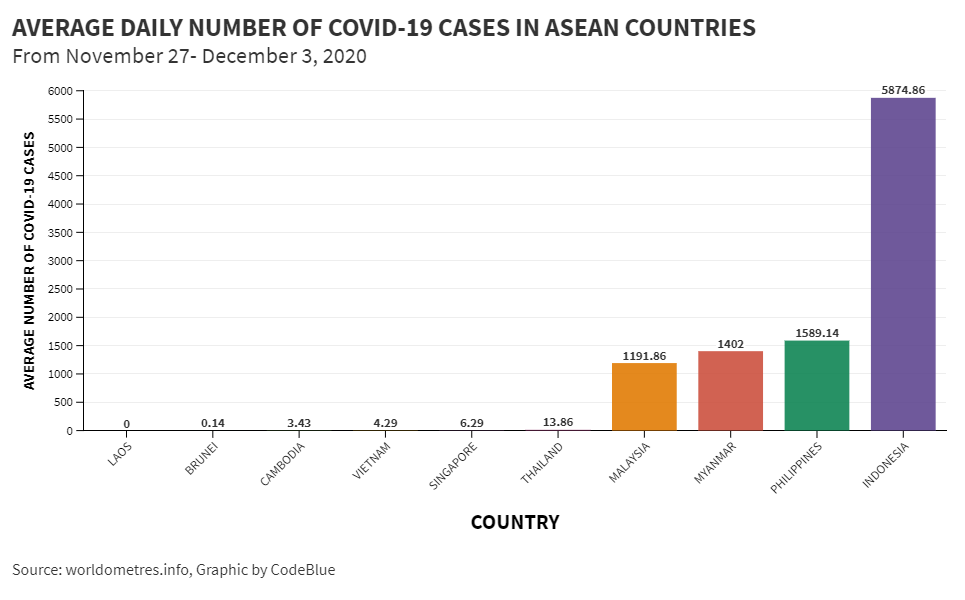KUALA LUMPUR, Dec 4 — Malaysia surpassed 70,000 Covid-19 cases today and recorded the fourth highest average daily cases over the past week among ASEAN countries.
On November 18, Malaysia crossed the 50,000 mark and reported 50,390 total cases as of that day. Eight days later, on November 26, the Ministry of Health (MOH) reported that Malaysia crossed the 60,000-mark with 60,752 cumulative cases. Once again, after eight days, Malaysia passed the 70,000-mark with 70,236 total cases as of today, recording 1,141 new infections.
Malaysia recorded 19,846 positive coronavirus cases in just the past 16 days from November 18 to December 4, comprising 28.25 per cent of the nation’s total infections.
Currently, there are 10,799 active Covid-19 cases, including 129 of them in the intensive care unit whereby 53 of them are on ventilator support. The death toll remains at 376, as no new fatalities were reported today.
From November 27 till December 3, Malaysia had the fourth highest average daily cases among ASEAN countries. Malaysia’s average daily cases were 1,192 infections, slightly lower than Myanmar and Philippines that had an average daily cases of 1,402 and 1,589 respectively. Thailand, the fifth-ranking nation, reported 85 times fewer average daily infections than Malaysia.
Countries like Thailand and Singapore had much lower average daily cases over the past one week, with an average daily cases of 14 in Thailand and six for Singapore. Meanwhile, countries like Vietnam, with a higher population than Malaysia, had an average daily cases of four.
As for cumulative Covid-19 cases, Malaysia is also fourth highest among ASEAN countries as of today:
- Indonesia: 563,680 cases
- Philippines: 436,345 cases
- Myanmar: 95,018 cases
- Malaysia: 70,236 cases
- Singapore: 58,252 cases
- Thailand: 4,053 cases
- Vietnam: 1,361 cases
- Cambodia: 335 cases
- Brunei: 151 cases
- Laos: 39 cases
Klang Valley’s Average Daily Covid-19 Cases Drop For First Time
Today, 50.7 per cent of the total 1,141 cases reported were from the Klang Valley (578 cases). A Conditional Movement Control Order (CMCO) was implemented on October 14 in the Klang Valley. The government has yet to announce if the two-month lockdown will be extended beyond December 6.
There has been a consistent increase in the trend of average daily cases in the country’s economic centre comprising Selangor, Kuala Lumpur, and Putrajaya from October 3 till November 27.
From November 21 till November 27, the average Covid-19 cases reported in the Klang Valley were 728 cases, but for this week from November 28 till December 4, the average cases dropped to 578 cases — marking the first decline in eight weeks. Last week’s average was pulled up by the historically high 2,188 coronavirus cases reported in 24 hours on November 24.
Malaysia’s largest cluster, the Teratai cluster from the Klang Valley, reported 62 positive cases today, bringing the cumulative Covid-19 cases from this cluster to 5,156 cases, with a positivity rate of 77.7 per cent.
Meanwhile, four additional clusters were reported in Klang Valley today. Details of each cluster from Klang Valley is as below
- Tapak Bina Muda cluster: Detected in Titiwangsa, Lembah Pantai, and Kepong in Kuala Lumpur during a workplace screening. This cluster has a positivity rate of 3.18 per cent.
- Tapak Bina Galeri cluster: Detected in Lembah Pantai and Cheras, Kuala Lumpur during a construction site screening. This cluster has a positivity rate of 6.89 per cent.
- Bukit Dalam cluster: Detected in Lembah Pantai, Kuala Lumpur during a symptomatic screening. This cluster has a positivity rate of 22 per cent.
- Jalan Genting cluster: Detected in Titiwangsa, Kuala Lumpur and Bentong, Pahang during a workplace screening. This cluster has a positivity rate of 66.67 per cent.
According to Health director-general Dr Noor Hisham Abdullah, on December 3, a total of 26,895 RT-PCR tests were done across the country, using only 45 per cent of the actual capacity of all 62 RT-PCR labs nationwide.
According to the United States’ Johns Hopkins Bloomberg School of Public Health (JHSPH), a high positivity rate, which the World Health Organization (WHO) describes as above 5 per cent, means that there’s high coronavirus infection rates.
One way suggested by JHSPH to reduce the positivity rate is by simply testing more people and isolating those infected. JHSPH said when there are not enough people who are being tested in one area, those who do not know that they are infected will be continuously spreading the infection.
MOH Mulls Shortening Quarantine For Overseas Travellers
Dr Noor Hisham also said that MOH is currently reviewing data if they could cut short the 14-day quarantine period for those returning to Malaysia from overseas.
“As you’re aware, some countries quarantine for seven or even 10 days, but we need to substantiate with data. We are reviewing the data,” Dr Noor Hisham said during his press conference on Malaysia’s daily Covid-19 cases.
“When we look into Day 13, from our data, we swab them or test them on Day One and Day 13, or if they have symptoms during quarantine, it will be taken into consideration to repeat the swab. So far, it has worked well.
“Looking at current data, can we shorten the period of quarantine to perhaps 12 or 10 days. When we shorten quarantine to 10 days, the risk is probably five per cent. We need to manage the risk but we’re reviewing data before changing policies,” the Health director-general said.








